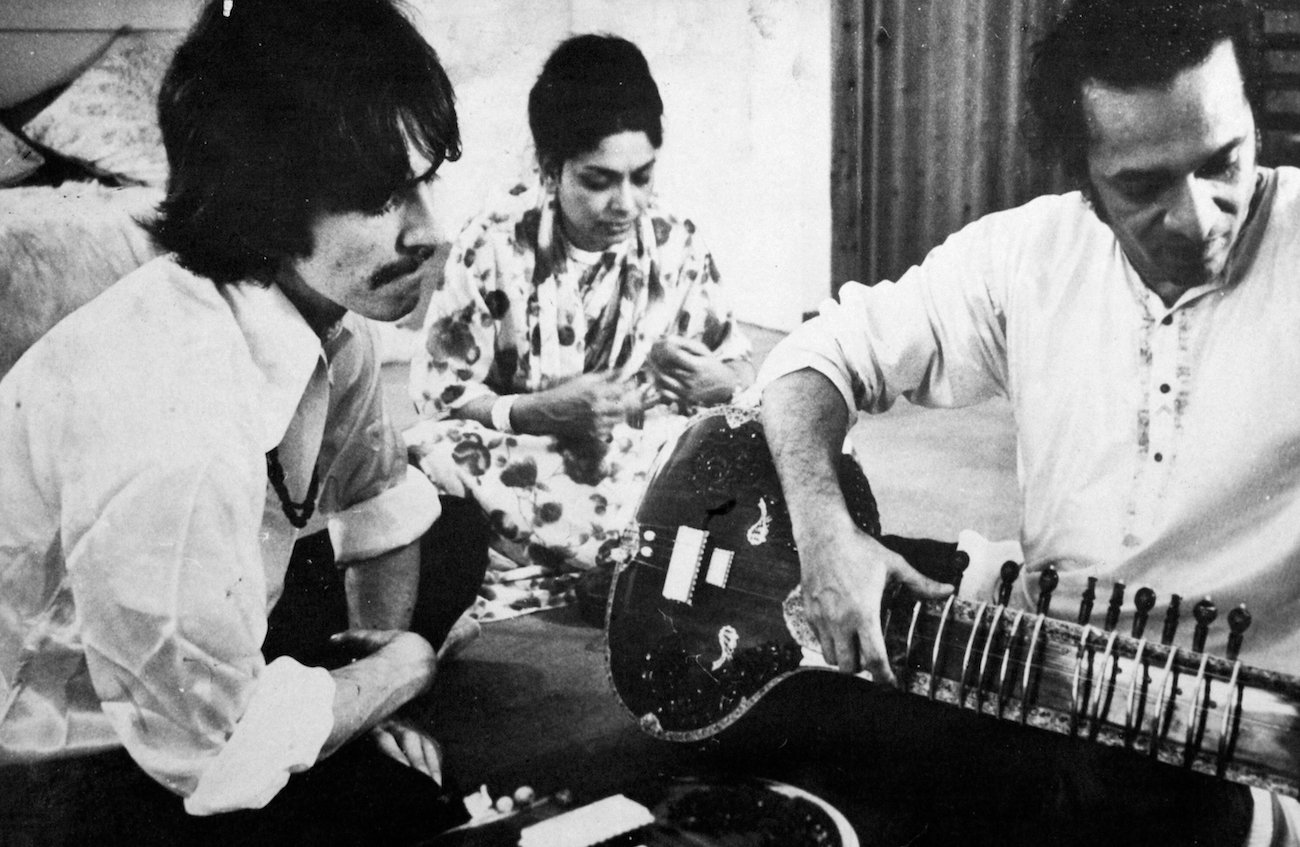Ravi Shankar Had to Keep His Mouth Shut About How Terrible He Thought The Beatles’ ‘Norwegian Wood’ Sounded
Legendary sitarist Ravi Shankar and The Beatles had a meaningful relationship. Without Shankar’s influence, The Beatles might not have experimented with new sounds.
However, Shankar didn’t enjoy The Beatles’ “Norwegian Wood (This Bird Has Flown)” off one of their first experimental albums, Rubber Soul. He loved that it brought eastern music to a new audience, but George Harrison had a lot to learn about the sitar.
Still, as he started teaching George how to play the right way, Shankar couldn’t reveal his real thoughts on “Norwegian Wood.”

Ravi Shankar impressed The Beatles’ George Harrison
George first heard Indian music in utero. His mother used to play Radio India while she was pregnant with him. However, George didn’t hear the mystical melodies fully until The Beatles filmed a scene of Help! in an Indian restaurant in 1965.
He couldn’t get the sound of sitars out of his head. So, George took some lessons and added the instrument to The Beatles’ “Norwegian Wood.”
Following that, George kept hearing about Shankar. “The third time I heard it, I thought, ‘This is an odd coincidence,'” George told Billboard (per Beatles Bible). So, he bought one of Shankar’s records. When George played it, an eerie feeling came over him.
“I put it on and it hit a certain spot in me that I can’t explain, but it seemed very familiar to me,” George explained. “The only way I could describe it was: my intellect didn’t know what was going on and yet this other part of me identified with it.” Without even knowing it, George felt something very important in Hinduism. He felt as if he knew Shankar from a past life.
In 1966, George met Shankar at a friend’s house. Shankar told Rolling Stone, “I had heard of the Beatles, but I didn’t know how popular they were. I met all four, but with George, I clicked immediately. He said he wanted to learn [sitar] properly.
“I said it’s not just learning chords, like the guitar. Sitar takes at least one year to [learn to] sit properly because the instrument is so difficult to hold. Then you cut your fingers to this extent [shows tips of two fingers – purple, with calluses]. He said he would try. He seemed so sweet and sincere that I believed it.”
Contrary to popular belief at the time, George’s newfound love for eastern music and spiritualism wasn’t a passing fancy. He tried his best to with the sitar, even though his playing was terrible.
Shankar didn’t enjoy The Beatles’ ‘Norwegian Wood’
Although “Norwegian Wood” was the first Beatles song to incorporate the sitar, it didn’t go down well with Shankar.
“To tell you the truth, I had to keep my mouth shut,” Shankar continued to Rolling Stone. “It was introduced to me by my nieces and nephews, who were just gaga over it. I couldn’t believe it, because to me, it sounded so terrible.”
However, George was willing to learn the correct way, and he wanted Shankar to teach him. “From the moment we met, George was asking questions, and I felt he was genuinely interested in Indian music and religion,” Shankar said (per Quartz India).
“He appeared to be a sweet, straightforward young man. I said I had been told he had used the sitar, although I had not heard the song ‘Norwegian Wood.’ He seemed quite embarrassed, and it transpired that he had only had a few sittings with an Indian chap who was in London to see how the instrument should be held and to learn the basics of playing.
“‘Norwegian Wood’ was supposedly causing so much brouhaha, but when I eventually heard the song I thought it was a strange sound that had been produced on the sitar.
“Then George expressed his desire to learn the sitar from me. I told him that to play sitar is like learning Western classical music on the violin or the cello. It is not merely a matter of learning how to hold the instrument and play a few strokes and chords, after which (with sufficient talent) you can prosper on your own, as is common with the guitar in western pop music.”
“We fixed it that he would come to India to learn in more depth. I felt strongly that there was a beautiful soul in him, and recognised one quality which I always have valued enormously and which is considered the principal one in our culture—humility.
“Considering that he was so famous—part of the most popular group in the world ever!—he was nevertheless quite humble, with a childlike quality that he has retained to this day.”
Shankar and George remained close friends
After Shankar gave George some sitar lessons, the instrument popped up in more and more Beatles’ songs. George said the new sounds started to influence the inflection of his playing. Therefore, Shankar had changed The Beatles.
In 1992, Guitar World pointed out that once Indian music ingrained itself into George, his guitar playing became “more elastic, yet very precise.” George was “finding more notes between the cracks, like you can in Indian music-especially on your slide work.” They asked the ex-Beatle if there was a connection there.
“Sure, because whatever you listen to has to come out in some ways or other,” George explained. “I think Indian music influenced the inflection of how I played, and certain things I play certainly have a feel similar to the Indian style.”
According to Quartz India, George said, “Ravi was my link into the Vedic world. Ravi plugged me into the whole of reality. I mean, I met Elvis—Elvis impressed me when I was a kid, and impressed me when I met him because of the buzz of meeting Elvis, but you couldn’t later on go round to him and say, ‘Elvis, what’s happening in the universe?'”
Through the years, George and Shankar’s relationship grew. “[Harrison] gives me tremendous respect,” Shankar told Rolling Stone. “He’s very Indian that way. We are such good friends, and at the same time, he is like my son, so it’s a beautiful, mixed feeling.”
We have to thank Shankar for not only giving The Beatles a new sound but for being such a great mentor and friend to George.


